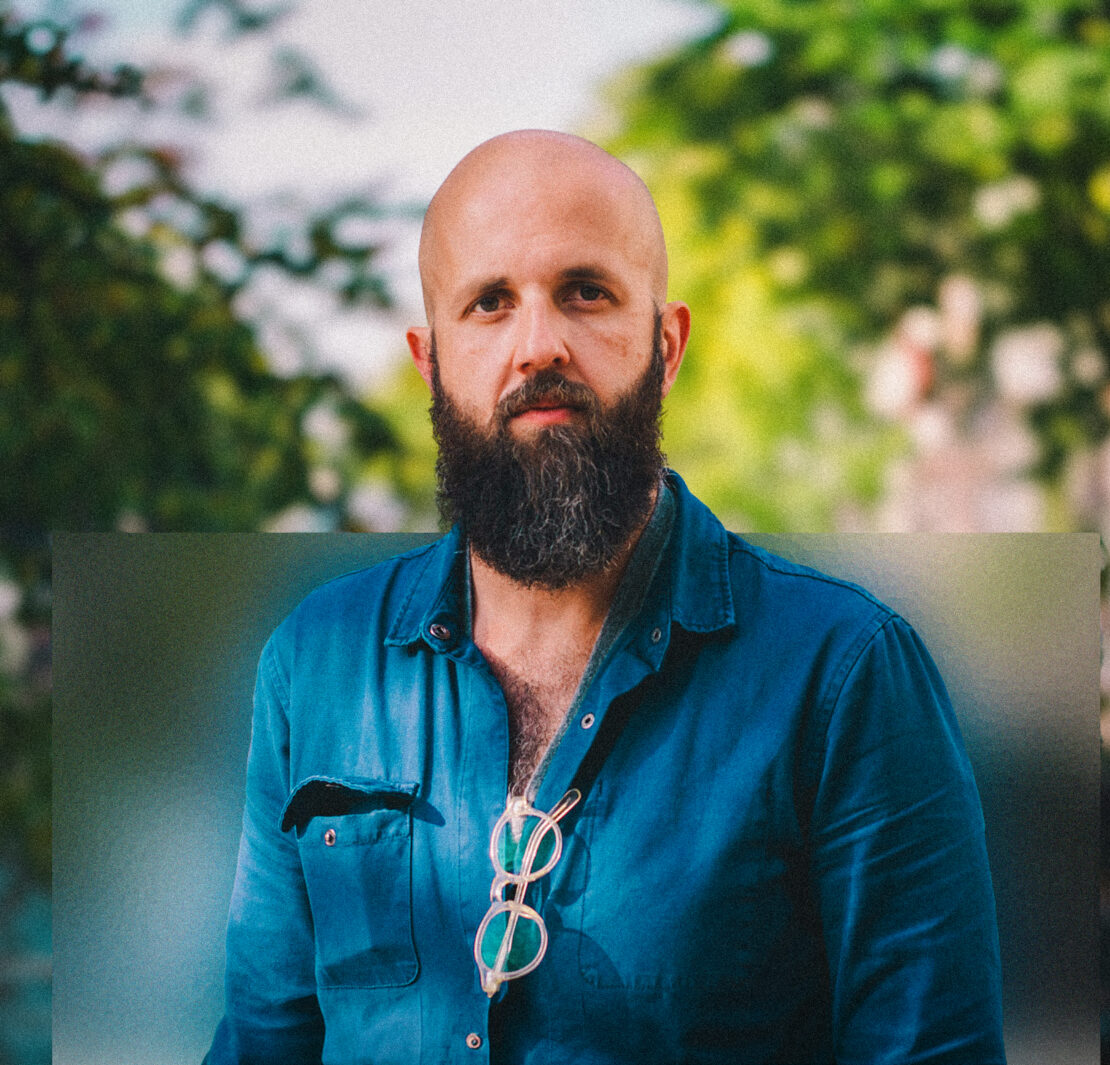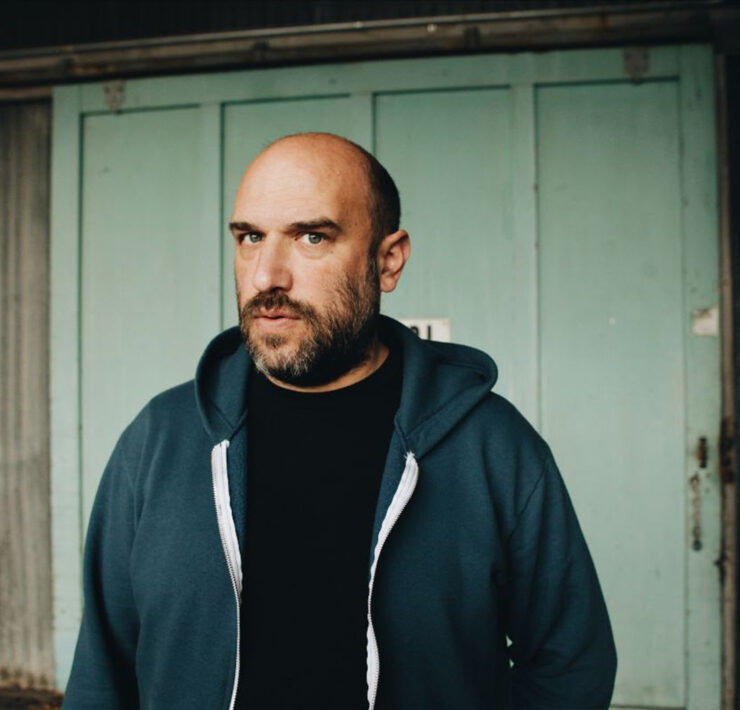Editor’s note: This article originally appeared in RELEVANT’s summer 2021 issue.
William Fitzsimmons is coming off a fight with his daughter. For most of her nine years, Fitzsimmons and his ex-wife have detangled her hair — a process she has come to resent. On this occasion, she decided that she’d rather cut all her hair off than detangle it again.
“Preaching to the choir on that one,” Fitzsimmons chuckles, rubbing his own hair-less dome. He’d told her as much, which he says went over “not great.” His daughter is bi-racial and self conscious about her hair.
“You don’t want to invalidate the feelings but you want to teach them to count the blessings,” he says.
That’s something Fitzsimmons specializes in. He’s crafted a quietly compelling career out of moody folk music that marinates in heartache, loneliness and betrayal. Before music, he’d built a career as a therapist after getting his degree in counseling, but switched to music after a handful of early tunes exploded in popularity online. His music caught the attention of fellow songwriters like Brooke Ligertwood and Ingrid Michaelson. 2008’s The Sparrow and the Crow was iTunes’ pick for the best singer-songwriter album of the year. Plumb placement on shows like Private Practice, One Tree Hill and Teen Wolf followed, and Fitzsimmons’ career has been followed by a modest but fiercely devoted collective of fans who spend his live shows singing along with every single word.
All that being said, he still sees his current career as being closely aligned with his former work as a therapist.
“Music, in some ways, is actually faster than therapy,” he says. “Because you’re not actively working it out and talking about it. You can just hear a line or melody and you just start crying.”
Fitzsimmons is intrigued by the ways that music can sneak up on you and, in a way that’s a little hard to quantify, help you find healing. In fact, he says it happened to him the very morning of our conversation. He had the Godspell soundtrack on and, well, he got ambushed.
“I’m sitting there making turkey sandwiches and I just started to cry,” he says. “Part of it’s nostalgic. But the music is so good and it’s meaningful to me and my worldview. It hit me. I heard it like it was the first time and it just knocked me to the floor. Not a lot of stuff can do that.”
It’s an interesting topic. The subject of mental health is ascendant these days as we collectively take an assessment of our pre-post-pandemic lives. Fitzsimmons says that everyone is a little “frayed” like an old pair of jeans. We all need a little therapy, and he’s seeing a licensed one regularly. But while he doesn’t think music is a substitute for therapy, he does think the two can work in tandem. It’s helping him, at least. And he hopes that his new album Ready the Astronaut can help provide a little therapy for others.
A Light, Not a Door
Fitzsimmons is a Pittsburgh native, raised by two recreational musicians who taught him to play a host of instruments. Fitzsimmons’ parents are blind, something bullies latched onto. He struggled to fit in until college, when he found confidence, community and acceptance through his music. It made him feel distinct.
“I mean, a white guy with a guitar. That’s not that different,” he acknowledges. “But at the time in the culture that I was in, it was. All of a sudden I was like, ‘This actually is cool. I’m glad I’m not on the football team and dating a cheerleader.’”
Eleven studio albums later, Fitzsimmons’ music is still a source of belonging for him, even as it’s been used to chart some of his most difficult experiences — divorce, unfaithfulness, the failure of his parents’ own marriage. But furthermore, Fitzsimmons’ music is obsessed with our interior lives and the way they’re shaped by the things that happen to us. He credits music with helping him identify his own impulses, and providing context for what he was going through.
“I think music is good at uncovering emotions that you need to process,” he says. “But as far as getting to the next step, maybe it’s done that for a lot of people. It’s never done that for me. For me it’s like, ‘There’s something I need to work on.’”
In other words, if you’re feeling stuck in a dark room, music probably isn’t the way out — but it might be a light to help you find the door. And if listening to music is capable of providing that level of self-reflection, just imagine what writing it can do.
More Honest
“I liken it just to journaling,” Fitzsimmons says of songwriting. “It’s the mirror that happens in therapy …I’ll write a line and then come back to it the next day and think, ‘Holy crap. That’s true. That’s exactly how I’m feeling.’”
Fitzsimmons says that keeping his feelings inside “rots” him, and songwriting is a way of exorcizing his emotional demons. He thinks everyone should be writing more, in some capacity. For him, it’s writing music. For you, it might be a journal, a blog, whatever. The important thing is that you do it.
“There’s something about it being inside your own head that means it never changes. It stays there,” he says. “It’ll eat you up, man. It’ll eat you up.”
He says songwriting also helps short-circuit our tendency to self-censor around others. He pulls out an interesting analogy about how we can tend to live like we’re in line to speak to the bereaved at a funeral. There are two or three people ahead of us, offering their condolences, and we’re second guessing what we’re supposed to say.
“There are things that we say,” he says. “Some of them are neutral, some are helpful and many are not helpful at all. Like, ‘God must’ve needed another angel,’ or something like that. I’m like, ‘Nope. Don’t say that.’”
There might be some value to having that level of self-editing at a wake, but Fitzsimmons says we’re far too censorial when it comes to our own thoughts and feelings. “I think writing — it doesn’t have to be music, but just writing in general — allows me to be more honest,” he says. “And to reflect on that honesty.”
And for Fitzsimmons, honesty often means being honest about his own grief.
“I feel zero guilt about that whatsoever,” Fitzsimmons says when asked about the general melancholy tone of his music.
“‘When are you going to write a happy record?’” he says, mimicking conversations he’d heard. “‘Why don’t you write something more upbeat or uptempo?’” He rolls his eyes.
“I mean, look,” he says. “The answer is: I don’t know. I like writing about hard stuff. I get joy from that. I get release from that. I don’t really understand happy music.”
It should be noted here that Fitzsimmons does not come across like a sad person, although he’s certainly gone through his fair share of difficult things. Maybe that’s because he writes about the trials he’s been through. He channels his struggles through his art, and is rewarded with a reasonable degree of emotional stability.
“I think what I’m presenting is actually, for the most part, who I am,” he says. “Might not be the entirety of who I am. I love laughing. I think that I’m kind of funny but I don’t know. I like gut-punches, man! Those are the lines that get me.”
Fitzsimmons is well-versed in gut punches. He’s weathered a couple divorces now, which he’s detailed through his music. He may not feel like the things he’s been through have made him a one-note person, but he is aware that he gravitates towards stormier seas in both his creative work and his own relational life.
“When I sit down by the piano or pick up the guitar,my mind just goes to the more difficult stuff,” he says. “I do that in conversation too. If I’m at the merch table after the show and somebody starts talking to me about psychology or some hard thing …If they’re like, ‘Yeah, my dad died two years ago and your song really meant a lot to me,’ well, let’s talk about it! That’s the stuff for me. That’s where life is.”
Fitzsimmons says he’s jealous of people who can write music without having some sort of difficult experience that pushes them into a season of songwriting. He says he needs something external to push him into a songwriting phase. “Neil Diamond, Carole King, they can just sit down and write an awesome song! I can’t do that,” he says. “I have to have gone through something that I need to get out of my chest. Doesn’t mean it’s going to be good, but that’s the only way I can do it.”
But then, maybe this is part of Fitzsimmons’ own therapy process. He’s writing music as a way of working through his life — the way you might use journaling. And, yes, that might make for more despondent music in general. But then, it’s also proved to be a key part of his healing process. And who knows? Listening to it might be part of yours too.

























